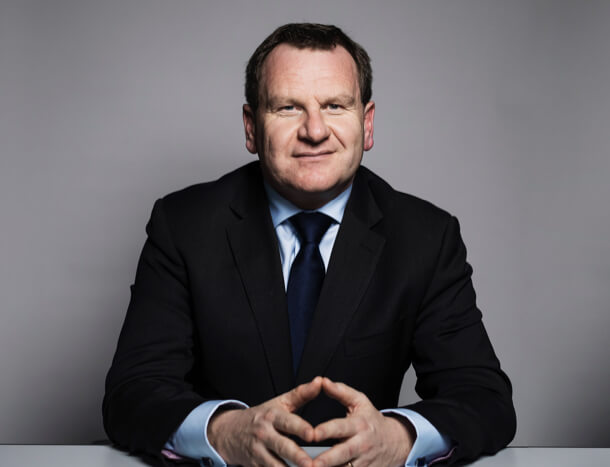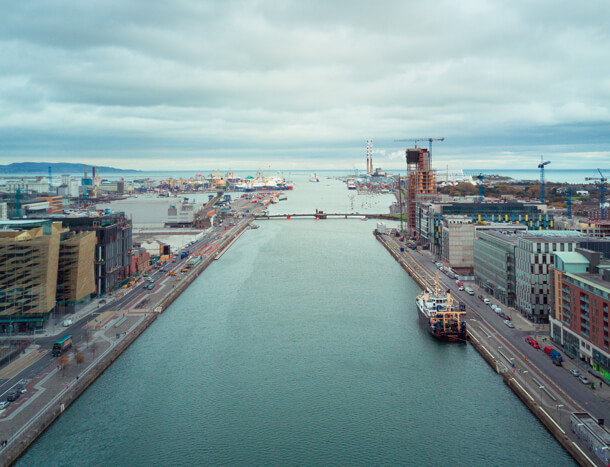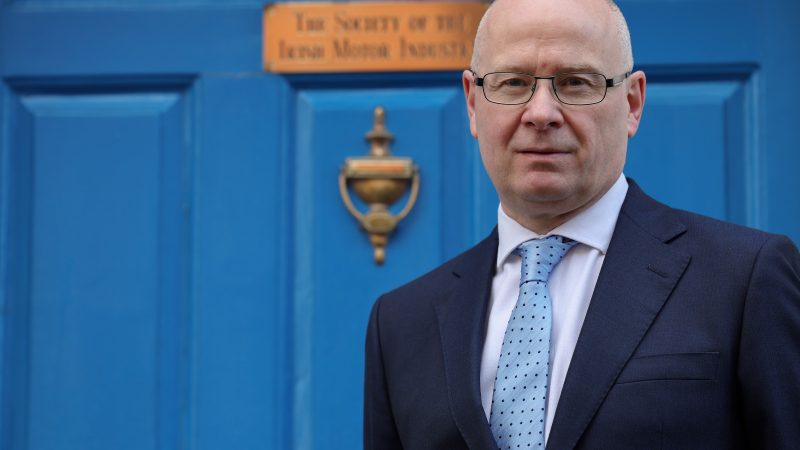Interview: Ibec’s Danny McCoy

Ibec is Ireland’s largest lobbying and business representative group – with a wide range of stakeholders, and covering a diverse range of interests. IF&CR asked its CEO Danny McCoy about Ibec’s priorities and role in representing the interests of the forecourt and convenience retail sectors.
A Strong Economy
How does Ibec manage to balance representation across so many interests, industries and sectors?
“The conditions that create a strong economy conducive to business growth are a shared goal of all businesses, regardless of sector or size. Together with our 39 trade associations, we lobby governments and policymakers, both nationally and internationally, to maintain a positive business climate and drive economic growth” explained Danny.
“We also regularly produce market-leading industry and business events, as well as provide insights on issues impacting business, economic research, forecasts, and analysis.
“With over 300 staff, we engage with key stakeholders in Ireland through our six regional offices and internationally through our Brussels office and extensive networks across the EU, UK, and US. Ibec is a world leader in business representation.
Priorities
In terms of lobbying and policy work – what would you say are Ibec’s priorities currently?
“Ahead of the Irish General Election, we recently launched our own election manifesto, Electing for Business, highlighting key business priorities for the next government. The manifesto emphasises the crucial role of business and economic growth as drivers of societal progress. Ibec outlines four main areas of focus: domestic competitiveness, quality of life, Ireland’s global positioning, and preparing the future workforce” he said.
“A major concern is the risk of complacency during this period of significant economic strength, particularly regarding future business growth. While the economy is performing well, many businesses, particularly retailers, are facing very significant labour cost challenges.
“Key recommendations include curbing major employment costs hikes, accelerating infrastructure delivery, improving public services, enhancing lifelong learning, and reducing regulatory burdens. While Ibec is optimistic about the resources available to the next government, now is the time to address longstanding issues like slow infrastructure development and housing shortages, as future governments may not have the same resources.
Sustainability and Transition
Sustainability and transition are both high on the agenda for fuel retailers – it’s a complex and uncertain time for many – how is Ireland doing in your view to meet the targets?
“The transition to a net zero circular economy presents major opportunities to grow the Irish economy, create jobs, enhance energy security, and improve quality of life for all. In a changing world, investors, consumers, and talent follow environmental integrity, the transition away to high carbon activities is now both an economic and environmental imperative.
“However, Ireland’s ambitious climate and environmental targets are not backed by the necessary polices, supports, and resources. Ireland lacks a clear vision for what a circular net zero economy looks like. There remains great uncertainty regarding the role and interplay of different technologies/climate solutions and how the transition will be financed. The next Programme for Government must prioritise smart forward planning, a scaling up of public and private investment, faster policy development, and a speedier roll-out of infrastructure to deliver on our decarbonisation targets.
Trade Associations
Ibec represents 39 trade associations covering a wide range of industry sectors – are any of those trade associations allied to the forecourt and convenience retail sectors? If so, how does that relationship work – for example, do you link on various campaigns and shared interests?
“Within our membership, we have sectors that represent the needs of the retail industry. In recent years, several major events have significantly impacted the retail and broader economic environment, including Brexit, a global pandemic, and rapidly increasing costs.
“Against this evolving backdrop, Retail Ireland has worked to directly support its members and ensure that the government’s response protects the key interests of the sector. Several notable Ibec and Retail Ireland campaigns that have been central to the priorities of the retail sector include our recent 2025 Budget campaign, a cost competitiveness campaign highlighting the impact of rising labour costs on businesses, and the launch of Ibec’s aggression toolkit, which is designed to help businesses address the increasing incidents of aggression and harassment toward their staff.
Successful campaigns
What successful campaigns and outcomes has the organisations had in recent years – can you provide some examples of where/how Ibec has influenced policy and perhaps legislation for the benefit of members?
“Ibec has run several successful campaigns that align with the priorities of Irish businesses and the broader economic and social landscape, making significant strides in influencing policymakers. This has included our recent campaigns around local, European, and national elections, Budget 2025, and cost competitiveness. While cost pressures remain acute for many businesses, Ibec work has led to a reassessment of the path towards a Living Wage which is likely to moderate increases to the National Minimum Wage over the coming years. We have also see a deferral of other labour market reforms due to cost concerns, including the introduction of pension auto-enrolment and Statutory Sick Pay.”
Professional services
Ibec provides a wide range of professional services and training to members on all aspects of human resource management, occupational health and safety, employee relations and employment law. Can you tell me more about these services – and what would our readers need to do if they wanted to become members of Ibec to be able to access these services?
“Few areas of business have become as complex and as centrally important as the areas of human resources, employee relations and employment law. Ibec provides specialist advice and support to our members on all aspects of employee relations and employment law. Our members benefit from unlimited telephone access to our Knowledge Centre for tailored advice and information as well as online resources and tools for general HR support. Our team of experts represent employers at the Workplace Relations Commission (WRC) and Labour Court. In addition, our team of Solicitors in our legal unit provide specialist employment law advice in addition to engaging with key stakeholders in monitoring, reviewing and influencing the development of employment legislation nationally and at a European level.”
More information can be found at https://www.ibec.ie/employer-hub/people-and-services/about-us
Technology
Technology, IA and other advancements will shape and change the fuel and retail sectors significantly in the coming years – looking ahead, and embracing technological change, how would you see the benefits / threats / opportunities in taking the country forward?
“Being a leader in technology, AI, and digital matters is crucial for our competitiveness, regional development, better services, resilience, and global standing. Digital leadership can create opportunities for government, business, individuals, and the EU. While Ireland is well-positioned as a digital frontrunner, progress is needed to close gaps in digital readiness and meet 2030 targets. With technological and regulatory changes accelerating, Ireland must strengthen its position to secure future investment and opportunities for businesses of all sizes.
Challenges
Themes we cover a lot in the magazine are the many challenges facing the convenience retail and fuel retailing sectors – from insurance, ever increasing overheads (staff costs etc), retail and forecourt crime – in fact just this week there was a March on Leinster House by the hospitality and retail sectors – to show their frustration with a raft of concerns. The fact that these business people literally took to the streets to March on their government seems to indicate the level of frustration and fear for the future of their businesses. What can/should the government be doing to help?
“While the economy remains robust with sustained growth, costs are rising rapidly, and many businesses, particularly in the retail sector, are struggling to maintain their margins. This year alone, the cost of doing business has increased dramatically due to government-imposed labour costs. Double-digit increases in the minimum wage, along with a series of additional changes implemented in quick succession—such as modifications to statutory sick pay, the introduction of pension auto-enrolment, substantial increases in salary thresholds for work permits, and enhanced protective leave entitlements—have imposed an unrealistic burden on businesses. While many of these changes have merit, our primary issue has been the lack of coordination, which has led to these costs unnecessarily converging. It is crucial that this does not happen again; any new policy and regulatory changes should be properly assessed for their cost implications for vulnerable businesses moving forward.”
CEO of Ibec
Tell us a bit about yourself Danny, and how you came to be CEO of Ibec?
“I have been the Chief Executive Officer of Ibec since 2009. Prior to joining Ibec, I was a senior economist at both the Economic and Social Research Institute (ESRI) and the Central Bank of Ireland in Dublin. I have held lecturing positions at Dublin City University, University College London, the University of Oxford, and Trinity College Dublin. Additionally, I have worked as a consultant for the European Commission and the Organisation for Economic Co-operation and Development (OECD).”
“I am a member of the Irish National Competitiveness Council, the National Economic and Social Council, the Commission on Taxation, and the National Training Agency. I led a European Macroeconomic Forecasting Network for the European Commission, comprising eleven national research institutes. I am also an Adjunct Professor at Trinity College Dublin Business School.
“I‘m also the former President of the Statistical and Social Inquiry Society of Ireland, an Honorary Fellow of the Academy of Engineers, a member of the Trade and Investment Council, the Executive Bureau of BusinessEurope, and a member of MaREI. I am a founder of ChapterZero Ireland and a member of the Government’s Balance for Better Business Group.
“My academic work in the early 1990s focused on carbon taxation and sustainable development, for which I received an economic scholarship and the Barrington Medal for researchers under 30. I was knighted by the Italian Government in 2022 for my services to European business and the economy. In 2023, I was inducted as a Member of the Royal Irish Academy, considered Ireland’s highest academic honour, and I recently received an honorary doctorate from my alma mater, the University of Galway, for Economics.”









